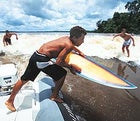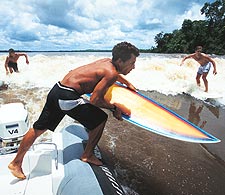SOMETIME AROUND MARCH 28, the moon will swing to within a mere 222,000 miles of South America. Sure, it’ll look pretty, but it will also create a miniature tidal wave that will rush hundreds of miles up the Amazon Basin, washing away trees, houses, and bewildered livestock as it closes in on the tiny Brazilian village of Sao Domingos do Capim.
Photo Gallery
Surf’s Up: Images from the Pororoca Splash awhile: Brazil’s Sergio Roberto de Sousa prepares for takeoff
Splash awhile: Brazil’s Sergio Roberto de Sousa prepares for takeoff
At which point Ricardo Tatui will leap out of a motorboat and try to surf it.
Tatui, a surfing instructor and former professional wave rider from the outskirts of Rio de Janeiro, is the reigning king of the Pororoca Surf Championship, an unusual and daring contest that, since 1999, has been held every spring in the village, located some 75 miles upstream from the Atlantic coast. Though no one has yet perished in this government-sponsored event, the eight competitors—mostly Brazilian pros like Tatui—are in for one hairy ride. To catch the pororoca (Tupi for “great noise”), which crests as high as four feet and roars upstream at more than 20 miles per hour, surfers must leap from boats and jet skis and drop in amid rolling logs, jagged debris, and the occasional alligator that gets caught in the wave.
“It’s something beautiful the way it comes thundering down through the jungle,” says Tatui, 33. “It’s the closest you’ll get to an endless wave.” Compared with an epic ride at the point break off Saquarema, some 1,500 miles to the south, where runs last about 30 seconds, Tatui’s trophy-winning 2001 performance atop the pororoca clocked in at a sweet eight minutes. While other contests are held on similar waves (collectively they’re called “tidal bores”) that hit rivers in England and France, the Pororoca Surf Championship is a backwash nonpareil. “The size, speed, and sheer remoteness of the pororoca make it very different,” explains Tom Wright, cofounder of the Gloucester, England-based Bore Riders Club, a group that surfs the two European rivers. Then there’s that other Amazonian wildcard that likely keeps Sao Domingos do Capim off the ASP circuit: piranhas.


